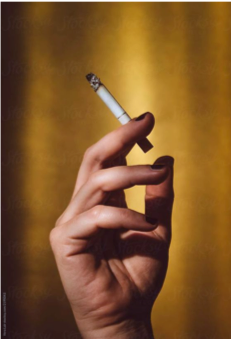Lifestyle factors that influence skin ageing
Every skin is unique and this is determined by both external and internal factors. In this blog we explain what the external factors are, how they can play a role in your skin aging process and what you can do about it.
SKINTIP
In this skin tip , Dr. Barbara Geusens talks about aging and prefers to use the term pro-aging rather than aging.
2 major components play their role in aging:
1. Intrinsic aging , that's your DNA
2. Extrinsic aging , which are external factors in your lifestyle
WHICH EXTERNAL FACTORS PLAY A ROLE?
The sun & UV rays

When you are in the sun, your skin is exposed to ultraviolet (UV) light, more specifically to UVA and UVB rays. Repeated, unprotected exposure to UV radiation can lead to premature skin aging, also known as photoaging . People with pale skin are more likely to suffer from sun damage because they are naturally less protected. UV radiation leads to the formation of DNA mutations and free radicals or ROS ('reactive oxygen species'). If we don't have enough antioxidants in our body to neutralize these ROS, there is an imbalance between ROS production and neutralization. The result is an accumulation of these ROS and the development of 'oxidative stress', which accelerates the aging process of the skin. The same goes for DNA mutations: the body repairs DNA damage through DNA repair and cell death mechanisms. When we get older or are exposed to a lot of sun, our body can sometimes no longer repair the damage and the risk of skin cancer increases.
The difficulty with sun damage is the fact that this varies greatly from person to person , making it impossible to give a value or duration that says how often or how long you can be in the sun maximum before you suffer damage. One person naturally has better protection mechanisms against sun damage than the other, e.g. DNA repair, pigment, antioxidant capacity...
As with UV radiation , high air pollution also causes the formation of ROS and the resulting oxidative stress. This results in various types of skin damage such as premature aging, pigmentation and skin cancer. The damage from atmospheric pollution is exacerbated by UV radiation. Especially in Asia, in countries such as China, India and Pakistan, a high degree of air pollution can be seen.
Pollution

Power supply

Nutrition is also an important factor, as it supplies vitamins and antioxidants to our body and skin. Nutrients with antioxidant activity are present in various fruits and vegetables. The intake of nutrients with antioxidants is important to support the internal antioxidant system to fight oxidative stress and prevent skin aging.
A Dutch study showed that people on a diet rich in red meat and snacks showed more facial wrinkles than people on a diet rich in fruit.
By using aggressive treatments (scrubs, high foaming or alkaline soaps, irritating creams, peels) you can destroy or damage your skin barrier. This can make your skin hypersensitive, often irritated and red . Irritations or inflammation also accelerate the aging of your skin. Dry skin is common in older people and tends to get worse if they take frequent hot baths and harsh soaps. Taking a bath now and then can certainly do no harm, but daily use of highly foaming cleansers, aggressive peels, alcohol products or scrubs can seriously damage your skin barrier.
Cosmetics and skin care products

Smoking

Frequent smokers may develop 'smoker's wrinkles' , which are wrinkles in the area around the mouth caused by the repetitive movements of the muscles around the lips when smoking a cigarette.
In addition, nicotine in cigarettes has a negative effect on vascularization in the dermis , resulting in a reduced supply of oxygen and nutrients to the skin and impaired wound healing of the skin. Smoking increases MMPs (matrix metalloproteinases) - enzymes that break down collagen - leading to a breakdown of the collagen in our skin. This reduces the firmness and structure of the skin and accelerates the signs of aging.
Chronic psychological stress can have a detrimental effect on skin aging. The precise mechanism of the influence of stress on skin aging is still not fully understood and investigated. However, recent research has shown that several mechanisms - such as telomere shortening, increased hormone production and oxidative stress - may play a role in skin aging.
stress

Sleep

While you enjoy your well-deserved sleep and rest, the body recharges, recovers and skin cells renew. The sleep phase is important for the skin, because the skin recovers from the damage it has received during the day and the skin cells renew themselves during the sleep phase. Chronic sleep deprivation can therefore lead to reduced barrier repair, a dull complexion and early signs of skin aging.
During our lives or the different times of the year we are exposed to different weather conditions . Weather changes, such as the sun, wind, dry air and cold can affect the condition of your skin and can play a role in the aging of your skin. In the winter, for example, cold and dry air can dry out the skin, making fine lines and wrinkles more visible.
Weather conditions

WHAT CAN YOU DO?
Think about the external factors to which your skin is exposed and take them into account when putting together your care ritual. For example, if you live in a busy city, you can use a vitamin C serum (conc. >10%) and eat plenty of fruits and vegetables to neutralize ROS or free radicals.
At Nomige we use a questionnaire to determine which external factors can play a role in the condition of your skin. Based on this questionnaire, we formulate a day cream that is adapted to your skin and acts on your needs. The questionnaire can be completed repeatedly, so we can take into account external factors that change over time.
In addition to the external factors, you should not forget that internal factors (your genetic profile) also play a crucial role in your skin condition and aging process. By performing a DNA test, Nomige can gain more insight into your skin aging process. In the lab we analyze several genes involved in collagen homeostasis, antioxidant protection, barrier function and skin hydration. Based on your DNA profile, we know what risks you carry for skin aging and we develop products whose ingredients specifically act on these risks.

DNA analysis & report
Learn more about DNA skincare & Nomige from Dr. Barbara Geusens
Watch an interactive and educational session where you will learn more about your skin, the role of your DNA, skin care and the concept of Nomige.
The online Masterclass is the ideal opportunity to learn more about Nomige and DNA skin care.
Do you want to know more about skin aging?
Skin aging is a very complex process that is influenced by both internal factors (your DNA) and external factors (such as the sun, pollution, weather conditions, smoking...). Every skin is unique and so is the aging process.
Follow our story
Connect with us and follow the hashtag #MyNomige to stay up to date on the latest skin tips and news.
Follow our story
Connect with us and follow the hashtag #MyNomige to stay up to date on the latest skin tips and news.



















































